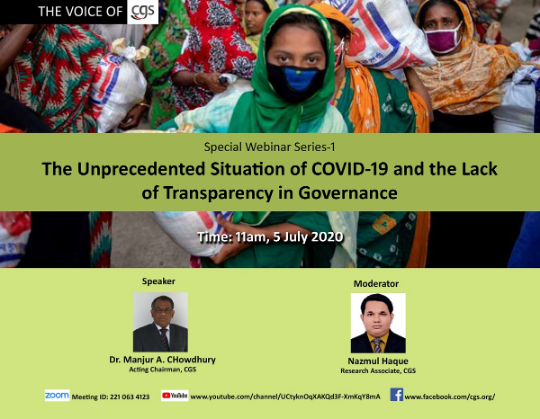The Unprecedented Situation of COVID 19 and the Lack of Transparency in Governance
05 July 2020
The Centre for Governance Studies (CGS) is a non-profit independent think-tank. The Centre is established to address the challenges for Bangladesh in coping with the rapidly changing national and global scenarios. The Centre has closely been observing the changing situation during the pandemic and publishes COVID-19 related analyses and situation update. To discuss the current issues, the Centre has initiated a special webinar serious titled ‘The Voice of CGS’ where CGS’s scholars expressed their concerns and discussed the issues.
Under ‘The Voice of CGS’ special webinar series, the Centre organized a webinar titled “The Unprecedented Situation of COVID 19 and the Lack of Transparency in Governance” on Sunday, 5 July 2020. The webinar was started at 11:00 am and it was ended at 12:30 pm. Dr. Manjur Chowdhury, Acting Chairman, Center for Governance Studies, was the keynote speaker of the event.
In this webinar, he talked about several important issues including COVID-19 related governance issues and corruption. While talking on COVID-19 governance, he said, “The concept of global village connects the entire world and made it the same state, where if one part of the word is infected by any short of a pandemic than the rest of the world will also be affected”. “Still, the whole world is trying heart and soul to confront the pandemic”. While talking about Bangladesh, he said, “The total percentage of COVID-19 patients and the death rate with COVID-19 symptom is higher in Bangladesh than compare to the other countries”. He added, “Lack of proper government initiative is responsible for this disaster”. “Moreover, there is a big inconsistency in the total number of death and the number of infected by Covid-19 due to the shortage of testing facilities and tracing system for COVID patients.”
He mentioned that corruption had been increased enormously in such a pandemic situation. Government interference in regular information flow made it impossible to publish news on corruption. Earlier in 1918, the world has experienced such an incident while the entire world hides the news of spreading Spanish flu, but a few countries published the news. He gave another example, in 1897, thousands of people died in plague disease in Bombay, Bal Ganga Dhar Tilak published news on it and the British Government arrested him in the Separatists' case and punished him under the Epidemic Disease Act for 18 months of Jail. Almost every Government have a tendency to lower the total number of the case than the actual number. While answering a question on corruption, related to the pandemic situation, he mentioned recent corruption in relief distribution and said this pandemic shows us how corruption has swallowed our entire society, they are not even letting off emergency relief programs from corruption. The government failed to control the situation from the very beginning because of mismanagement and corruption. He also said that in the post-COVID situation many governments would gain more authoritarian control and few would restart their economic cycle to ensure sustainable development.
The Webinar was moderated by Nazmul Haque, Research Associate, CGS.
